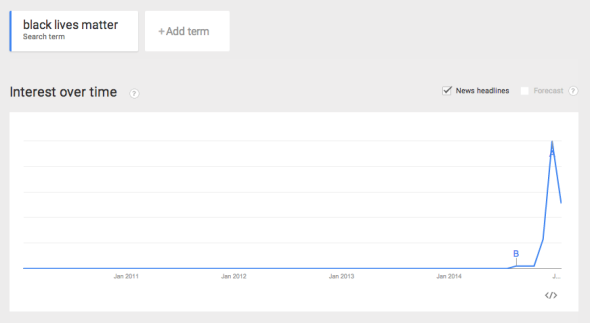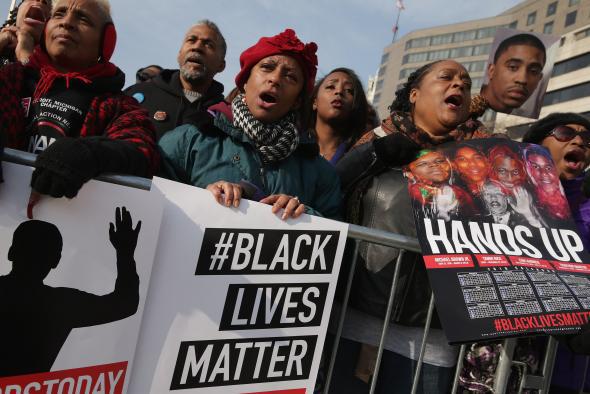Well, I didn’t manage to get an emoticon of the year vote added to the American Dialect Society’s annual Word of the Year award (there’s always next year!), but we did end up with a new category that’s almost as interesting: Most Notable Hashtag.
The hashtag that won—and subsequently took the overall Word of the Year, or WotY, prize as well—was #BlackLivesMatter, which exploded in the latter half of 2014 as a protest against the deaths of young black at the hands of police. Here’s a graph of search interest from Google Trends:

Google Trends
In the wake of the ADS vote, some have expressed skepticism about the legitimacy of a hashtag category in the first place and about the selection of #BlackLivesMatter for WotY. After all, you might say, #BlackLivesMatter—not to mention the other members of the category, including #ICantBreathe, #NotAllMen, #YesAllWomen, and #WhyIStayed—ought to be competing for Three-Word Phrase of the Year, if such a category existed. But what exactly is a word, anyway?
What makes a word a word, it turns out, is a surprisingly complicated question, but the American Dialect Society’s announcement notes that “Word of the Year is interpreted in its broader sense as ‘vocabulary item’—not just words but phrases.” OK, so what’s a vocabulary item, then?
Like the name suggests, a vocabulary item is something you have in your vocabulary: It’s an entry on the huge mental list of words that you know. And if you’ve never seen a word like wug or bligglethorpe before, you don’t know what it means. By contrast, you know what a sentence means not because you’ve got a huge mental list of all possible sentences, but because you can figure out how the words in it relate to each other, even if you’ve never seen them combined that way before. For example, you’ve probably never had a reason to learn the sentence, “Hold the newsreader’s nose squarely, waiter, or friendly milk will countermand my trousers,” (well, unless you’re a huge Stephen Fry buff), but it’s still clear what it means.
Under this definition, dogs is just a variant of dog, not an entirely different word, because if you know how plurals work in English, you can figure out what dogs means. In fact, you can also work out that the plurals of wug and bligglethorpe should be wugs and bligglethorpes despite not even knowing if they have a meaning. So dictionaries and SAT vocabulary lists tend to use the “vocabulary item” definition of a word, because really, why bother to list dogs and cats in addition to their singular form?
But there are a few complications. For one thing, some words have multiple definitions and uses. It’s not obvious, for example, that a tweet can be both the sound a bird makes and a 140-character message—so tweet must have a couple entries on your mental list of words. And that means that when an existing word takes on a new use or meaning, it can qualify as sufficiently noteworthy that it makes WotY lists—such as the American Dialect Society’s 2013 “because”, as in “because reasons” or “because yay.”
For another thing, there’s the question of what to do with idioms. A dictionary errs on the side of inclusion, because despite the fact that idioms seem to contain multiple “words,” together they have a meaning that you can’t get from looking them all up individually. For example, you can’t figure out what let the cat out of the bag means by looking up let and cat and bag, so you probably do have to have a separate entry for it on your mental list of words.
And it’s in this idiom category where I think certain hashtags belong. But not all hashtags, and not even all popular hashtags. Some are single words, such as #fail or #occupy, which may or may not acquire additional meaning just like any other single word. Others are transparently obvious from their components, such as #ExplainThe90sIn4Words or #AddaWordRuinaMovie. But #BlackLivesMatter doesn’t just assert that black lives matter. It’s also the name of a particular social and political movement that arose from the untimely deaths of Trayvon Martin, Michael Brown, and Eric Garner—and you can’t deduce that from just the name. In fact, that’s why there was so much backlash against response hashtags like #AllLivesMatter—of course all lives actually do matter, but it’s the black ones that are disproportionately treated as if they don’t.
To top it all off, as the Economist points out, the editors of Wikipedia have already realized that Black Lives Matter, with or without the spaces and hashtag, is exactly the type of phrase that people might need to look up for further context. Looks like a word to me.
Follow @lexiconvalley on Twitter and on Facebook.
